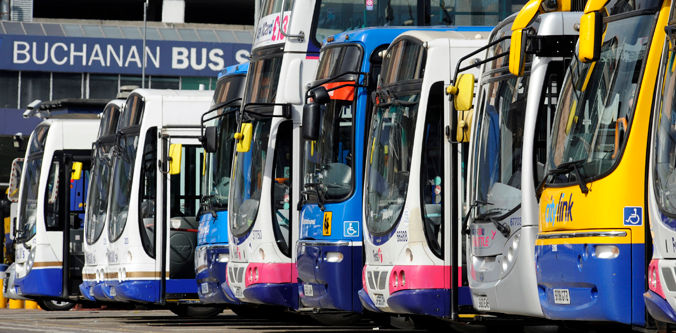SPT Approves Options For Bus Reform Including Franchising
- Ayrshire Daily News

- Mar 17, 2024
- 3 min read
Strathclyde Partnership for Transport (SPT) has approved the recommendations arising from the Strathclyde Regional Bus Strategy (SRBS) Options Development and Appraisal work at its Partnership meeting today (Friday 15 March).

SPT will now consult widely on the recommendations over the following months.
As part of the preferred options approved by the full partnership is that SPT should commence work on establishing local bus franchising, in line with the requirements of the Transport (Scotland) Act 2019. Franchising is a proven model for delivery of local bus services across Europe and beyond and provides the greatest certainty of making significant improvement to the network to achieve passenger growth, better accessibility for all, and deliver wider public policy outcomes.
However, as the cost of undertaking the franchising process to the point of implementation is estimated at up to c. £15m and could take between five to seven years to establish, it is further recommended that SPT and its partners should also progress with Bus Service Improvements Partnership (BSIP) arrangements in the short to medium term. This would provide a firm basis for private and public sector commitments to arrest further passenger decline, stabilise and improve the bus network while we work collectively to establish the franchise model.
These options received the support of the SPT board which includes local authority representatives from across the political spectrum. SPT chair and vice chairs representing SNP, Labour, and Conservative welcomed the recommendations and the clear, evidence-based, objective led approach SPT took to consider all the possible delivery model options.
SPT chair Councillor Stephen Dornan (SNP) said:
“This is a bold and ambitious plan from SPT which sets a strong approach to tackle a declining bus market. It gives us opportunities to build for growth, and deliver a network that is attractive, accessible, and affordable to both passengers in our communities who rely on the bus to get around and those who we need to get ‘onboard’ by offering an attractive alternative to the private car.
“However, any franchising option will take time and investment to establish so we need to look at doing something now to halt the declining bus market. BSIPs, which also require suitable investment, offer the best opportunity for a significant, interim improvement while we work to establish the world-class local bus franchise model the people of the West of Scotland deserve.
“In order to progress any of these options, we need investment from the Scottish Government which now has to step up with real funding and a commitment to support public transport, particularly bus which for too long has been forgotten and now requires urgent action.”
Vice-chair Councillor Alan Moir (Labour) said:
“The preferred options presented by SPT today have the potential to revolutionise local bus services in the west of Scotland to the clear benefit of bus passengers and local communities.
“The need to stabilise the local bus market, deliver bus reform, and fully harness the strengths of all those collectively employed in the sector is also very clear. It is only by doing so that bus can fully contribute to our wider economic, societal, and environmental objectives. Allowing the continued decline of services is simply not an option, we all need sustainable local bus services to deliver so much more.”
Vice-chair Councillor David Wilson (Conservative) added:
“We have been presented with the best options to take forward proper bus reform for our area. The need for a long-term plan for bus is clear and comes after a full appraisal of all the options available against a range of criteria. Delivery of a competitive franchising model, as proposed, has the potential to harness the best aspects of the public and private sector collaboration in delivery of local bus services.
“To succeed – as it must do – local bus services require proper funding and investment for the medium and long term as well as support from politicians, from bus operators, and other key stakeholders, as well as and, most importantly, the public. We must also ensure that the options are integrated by improving bus priority on our roads, reducing congestion, again with adequate resources to fund a fully functioning network.”
To tell us what you think of the preferred options for the future of bus services in the west of Scotland, you are encouraged to take part in our upcoming consultation which will launch at the beginning of April.




